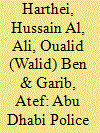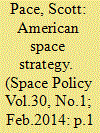|
|
|
Sort Order |
|
|
|
Items / Page
|
|
|
|
|
|
|
| Srl | Item |
| 1 |
ID:
130884


|
|
|
|
|
| Publication |
2014.
|
| Summary/Abstract |
Emergency services such as police vehicles must provide reasonable service levels in order to ensure public safety. These services are typically provided by vehicles based at fixed locations. The number and placement of vehicles generally influences the quality of services offered. Increasing the number of vehicles is often limited by cost constraints; therefore the efficient deployment of such service vehicles is a crucial issue. Emergency service vehicles must be located in such a way that they may reach any demand point within a maximal response time. Current Practices in Abu Dhabi The traffic police in Abu Dhabi perform two major functions: enforcing traffic Abu Dhabi Police Plans laws and assisting road users. Within the Abu Dhabi Police department, the Directorate of Traffic and Patrols, which is in charge of all traffic aspects, allocates the traffic patrol vehicles to routine work and to special operations. The special operations vehicles are involved in escorting convoys and motorcades and in enforcing traffic laws and regulations through the deployment of patrol officers in specific areas at certain times, or in dealing with incidents and special events. The routine patrols perform all remaining tasks. At present, the patrol car allocation process is largely manual and relies heavily on the knowledge, experience and expertise of the dispatch operators. The operators divide the Emirate into geographic zones and allocate patrols based on their knowledge about the areas' needs and other criteria such as traffic flow patterns, population density, etc. In the event of an accident or call for assistance, the dispatcher calls on one of the patrol vehicles nearby and assigns it the task of dealing with the event.
|
|
|
|
|
|
|
|
|
|
|
|
|
|
|
|
| 2 |
ID:
132561


|
|
|
|
|
| Publication |
2014.
|
| Summary/Abstract |
This Viewpoint addresses American space strategy and the choices that lie before US space practitioners. Space activities today play critical roles in U.S. national security, economic growth, and scientific achievements. Satellite communications link the world. The Global Positioning System (GPS) is an integral part of several critical infrastructures, and enables functions ranging from survey and construction, to farming, finance, and air traffic management e not to mention US military forces worldwide. Less well understood is how the GPS time signal provides a global time base for encrypted communications e including point-of-sale transactions with credit or debit cards. Without GPS, much of today's economy would come to a halt. Beyond the Earth, we have rovers on the surface of Mars, and a probe that has left the solar system. The International Space Station represents a unique collaborative
partnership between the United States, Europe, Canada, Japan, and Russia. Spacefaring states are concerned with the long-term sustainability and security of space activities as a result of increasing orbital debris and the proliferation of space capabilities of new national entrants, some of them potential adversaries.
|
|
|
|
|
|
|
|
|
|
|
|
|
|
|
|
|
|
|
|
|